Arts & Entertainment
Strong’s concordance
Alabama football superfan and D.C. resident comfortable with new role as a trans-masculine role model

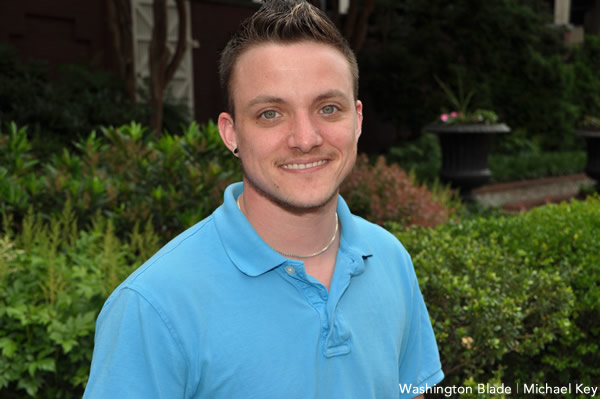
At 30, Eli Strong has become the local face of trans-masculine men for all who watched last week’s ‘American Transgender’ on the National Geographic channel. (Blade photo by Michael Key)
Eli Strong is a Washington-based trans-masculine University of Alabama fanatic and family man who became a television star and local hero last week thanks to a groundbreaking National Geographic documentary, “American Transgender.”
“I really appreciate all of the attention its been getting.” Strong told the Blade this week via phone when we called to chat about the reaction to the documentary, which took audiences into the lives of three transgender people living in different places around the country.
“It’s been a bit of a whirlwind for the last few days,” Strong says. “It’s been a snowball. I was already working with (National Center for Transgender Equality), but as soon as they posted about it, Huffington Post Tweeted about it, [the Washington Blade] Tweeted about it, GLAAD, and suddenly when you Googled it, it went from 10 hits, to just before the documentary aired it was pages and pages.”
Strong sounds both humbled and invigorated by the positive attention the documentary has received in the transgender community.
“I think the documentary can and did do good.”
Strong — now a database coordinator at Avalere, a health care advisory services company in Dupont Circle — came to Washington for an internship at Human Rights Campaign several years ago and followed that with a five-year stint at NARAL Pro-Choice America. However, Strong’s heart is in his home state of Alabama where his accepting family still lives.
We talked Strong’s obsession, football at his alma mater the University of Alabama.
“We lost a couple of good players,” he says, lighting up, recalling being at last season’s national championship game in New Orleans. “But I think It’ll be another good year.”
Strong studied social work at Alabama and received both his bachelor’s degree and masters degree from the University Alabama, as did both his parents. He says his wife — whom he’s celebrating his one-year anniversary with next week — knows that weekends in the fall belong to Alabama football in their house.
“Even in the darkest days of Alabama football, if you put us up against some of the best teams in the country, every year I look at that schedule and I go, ‘We can beat every team on the schedule’ and I feel the same this year.”
When it comes to his involvement in “American Transgender,” though, Strong says he and other trans leaders were “gun-shy” about the special before it aired based on prior television portrayals of the trans community that had been deemed “distasteful” or that “pushed someone to answer questions that they weren’t comfortable with.”
“I have every confidence that its going to turn out positive,” Strong says he told friends concerned about a sensationalized portrayal. “I had been very up front with National Geographic about what I didn’t want to discuss, and they very much respected those boundaries.”
“Those same people have said that it did turn out really well, and that they thought it was very well done and very respectful and very educational,” Strong says. “Some people have even said they’d hoped it be an ongoing series, rather than a one-off documentary show.”
WASHINGTON BLADE: What’s the reaction to “American Transgender” been like since the premier?
ELI STRONG: Everything that’s been said to me directly has been positive. I’ve seen one or two negative comments, but these weren’t people that have probably ever known a trans person. But for all the people that have contacted me directly, it’s been really positive for them.
I was up until about 12:30 that night talking to people all over the country on Facebook just saying, “Thank you for sharing your story and putting that out there.” They said it really meant a lot to them to see someone that had a similar path that they did. I heard from a lot of my family that thought it was really well done.
I feel like in general from the trans population and my family that everyone feels that not only was it a good presentation and that they enjoyed the stories, but that the way that National Geographic actually went about it was very tasteful and respectful of all those involved.
BLADE: You said some people were “gun-shy” that the depiction might be distasteful. What where they afraid of?
STRONG: A lot of people in the trans community had a very large problem when [Thomas Beattie] had gone on “Oprah,” where Oprah said, “Let’s get down to the nitty-gritty,” and asked about his genitalia. I was very upfront and said, “If you’re not married to me, its not really any of your business.” As a trans person, I’m a whole person, I’m not the sum of what surgery I have and haven’t had.
One of the things that I really enjoyed about this project was when I first discussed my participation in the documentary with [the producers] one of the things that made me feel more comfortable was that other than that opening segment on the show, there was no narration. Everything that was narrated was taken directly from mine and Jim and Clare’s direct interviews, and I thought that was a great way to do it, because there would never be a question of, “Is that how they really felt or is NatGeo putting words in their mouth.”
BLADE: What’s it like to go through that process in the D.C. area?
STRONG: I think it makes it both easier and harder. The easier part is something that I find that most people understand immediately. It’s a more liberal place to be. You have more access to groups and to people who are like you and like minds so you can discuss these issues or find people who have gone through the process and things like that. So in that way it’s a little easier. There’s a larger queer community, there are surgeons that are in the area, there are doctors at Whitman Walker that have experience so you don’t have to worry about — like say — had I gone through this in Alabama, with a doctor that may have never treated a trans person, and having a very hard time finding those that do.
But its also harder because living in a much more liberal area, and a much more politically correct area, people in D.C. are much more accustomed to gender variance. That being the case, when I lived in Alabama, even before I identified as male, I was “sirred” constantly. “Yes sir,” or “Can I help you sir.”
I was seen as much more male in Alabama, because the way I presented my gender, was not the way that they saw, it’s how they normally saw male, so to them it’s like, “You fit into this box.”
While in D.C., it’s both positive and negative that they are used to gender variance, but it becomes very frustrating for trans men that when I used to walk into a place and be completely presenting as male, someone would still “ma’am” me, because they would think, “This is a masculine lesbian and I don’t want to offend this person by saying ‘he.’”
It took at least three-and-a-half years of being on testosterone before people completely stopped saying “ma’am” to me.
I will tell you this though, I will take the negatives of D.C. over anywhere else any day when it comes to transition.
BLADE: What kind of legal hurdles does the trans community still face in D.C.?
STRONG: I don’t know so much if it’s the laws as it is the adherence to those laws. In D.C., I am protected from discrimination when it comes to employment, I am protected as far as the fact I can relatively easily get my drivers license changed, get my name changed.
And with outlets like the Washington Blade who have always made it much easier to post your name change documentation at a much lower rate than, say, a regular paper would, that does make it easier, and those laws are all there.
The problem comes in adherence to those laws and training employees on those laws.
There’s a law in D.C. that says you use the restroom as the gender you present as. There’s also a law that says if you have a single-use restroom, they have to be gender neutral. But just because that law exists, doesn’t mean that every business in D.C. follows that law or is even aware of that law. So do you want to bring it up and fight the good fight, or do you want to not make yourself the center of attention, and point this out? Now you’ve just outed yourself. The main factor in making that decision for me is safety. If I feel unsafe in that moment, I’m not going to say anything. I’m not going to do anything. I’m going to find a way out of that situation. While bathrooms should never be the central issue, its still a big issue, because, in my view, it’s the one place in public where you’re at your most vulnerable. There are a lot of restaurants that I will frequent because they will adhere to that law, without question.
BLADE: How did your involvement with “American Transgender” come about?
STRONG: I am on the coordinating committee for a D.C.-area trans-masculine social and support group. They found us and they simply sent the webmaster and myself an email and said, “Here is our project, can we email your group and ask people to participate?” and we said absolutely.
I think the reason they told me that they really like my story is because it was kind of ironic that I’m from the state of Alabama, and my entire family is about as Republican and very conservative and Catholic — not just Catholic as in I go to church every week, but as in my stepdad is in the Knights of Columbus and my mother is a Eucharistic Minister, and she does announcements every week and they are very involved in the church — and to have as much support as I have had coming from that environment, I think that they really found it very engaging and very hopeful and interesting to show.
BLADE: How did you feel after you watched the full documentary?
STRONG: Proud. I was very proud of not only how it was done, but how it came through once it was all finished. I was proud of my family for stepping up and putting themselves out there. I was very proud of all of the people that had spoken out. I looked around the room and had a lot of friends at the viewing party and I was very proud of them for being there the whole time.
BLADE: Are you a role model?
STRONG: If it’s a positive role model, then sure. I would like to think that I’m a role model, without that sounding really self-centered, only in so much as if something that I say or do can shed a positive light on the community or help somebody out … then sure. As long as it’s a positive one.
BLADE: What advice would you give to young people realizing that they are transgender?
STRONG: Be patient. Be patient with yourself. Be patient with those around you — particularly your family. I feel like a lot of people in the queer community, not just trans folks, but even when I came out as a lesbian at 16, one of the things that I lacked was patience. Even though I’d only kind of admitted it to myself three days before my mom found out, it was me, so I was OK with it so much faster than anybody else was. I didn’t understand, and said, “Well, I’m fine with this, why can’t you be OK with it?”
Just giving those around you the time to sort through it and just talk to them as much as you are able and they are willing.
And having patience with yourself and having patience with the fact that while you feel you weren’t born in the body you should have been, you can’t change that overnight and it can get very frustrating, because it’s expensive to transition and it’s not easy to transition. Just be patient and enjoy the process and try to learn from it as much as you can.
I found that having that patience with a lot of folks has brought us closer together and has made me a lot more sure in knowing who I am and being comfortable with who I am.
I really tried to figure out in that process of, “OK, there is a certain amount of time that I’m going to have to wait to save money and really figure out who I am.” I took advantage of that time to really explore who I was and what kind of person am I going to be. Because this isn’t just the end, just because you go through surgeries and hormones, that’s the beginning of your life, so what kind of life do you want it to be?
BLADE: What’s been the most fulfilling part of transitioning?
STRONG: Two things. One is feeling much more whole and who I am. For a long time, when I realized I was attracted to women, I thought, “Well I must be a lesbian,” and that was it, but I think I wasn’t happy with me. I constantly was battling this screaming voice. Now I feel so much more whole and much more calm.
The other part is not just feeling it myself, but having other people see it. A great secondary plus is that’s how other people see me now, especially my family. It’s great not to be “ma’amed” by a stranger, but to have my mother love me not as her oldest daughter, but as her oldest son.
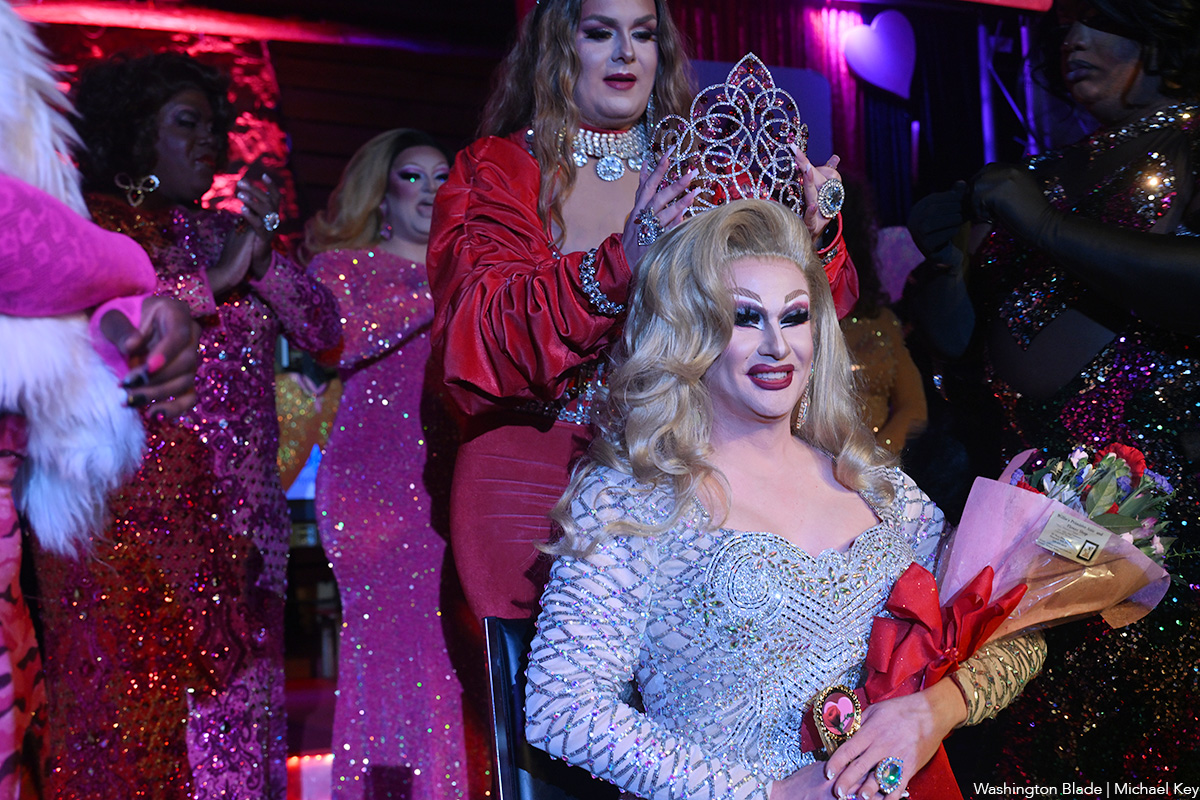
The 44th annual Queen of Hearts pageant was held at The Lodge in Boonsboro, Md. on Friday, Feb. 20. Six contestants vied for the title and Bev was crowned the winner.
(Washington Blade photos by Michael Key)
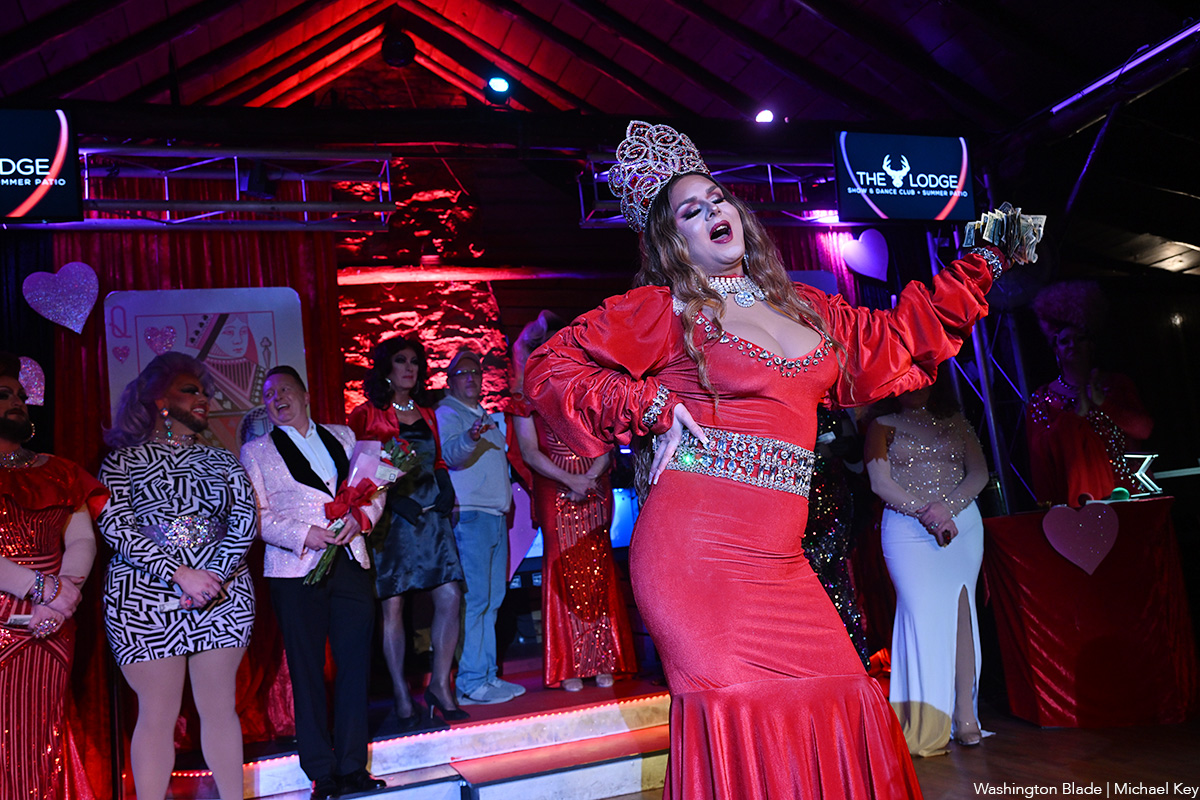
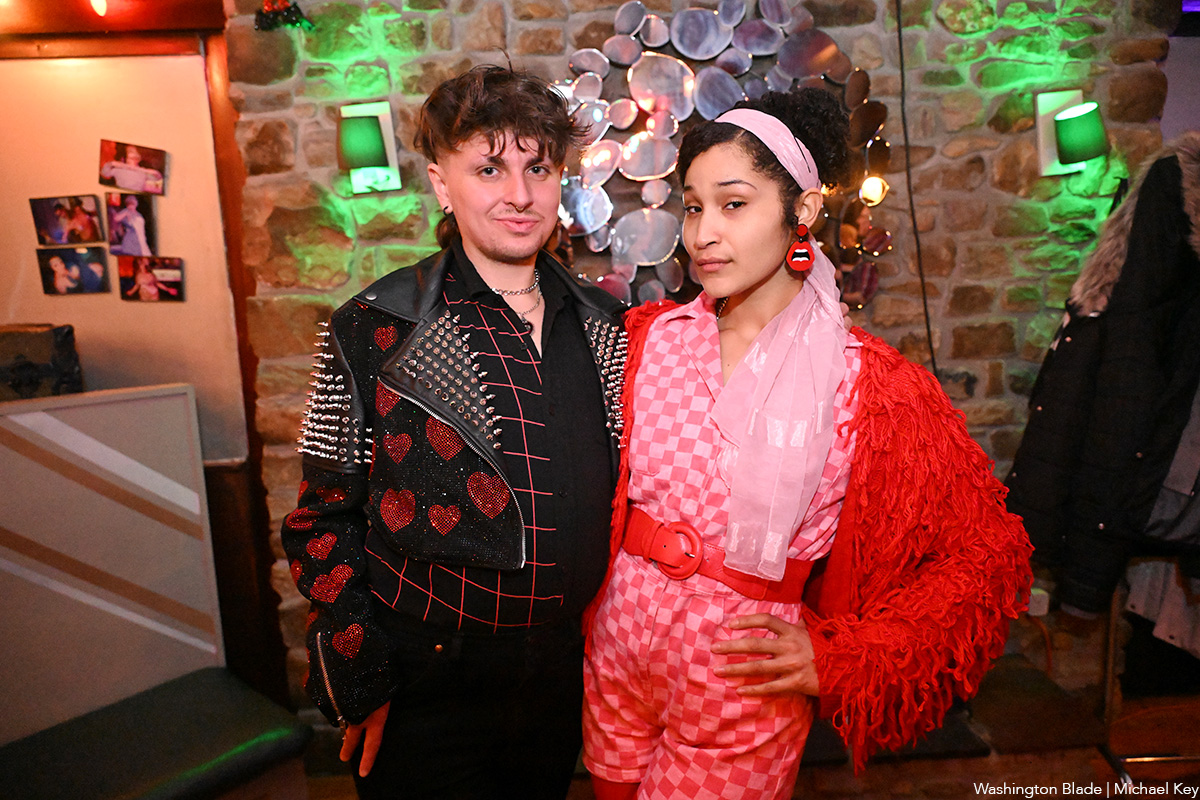
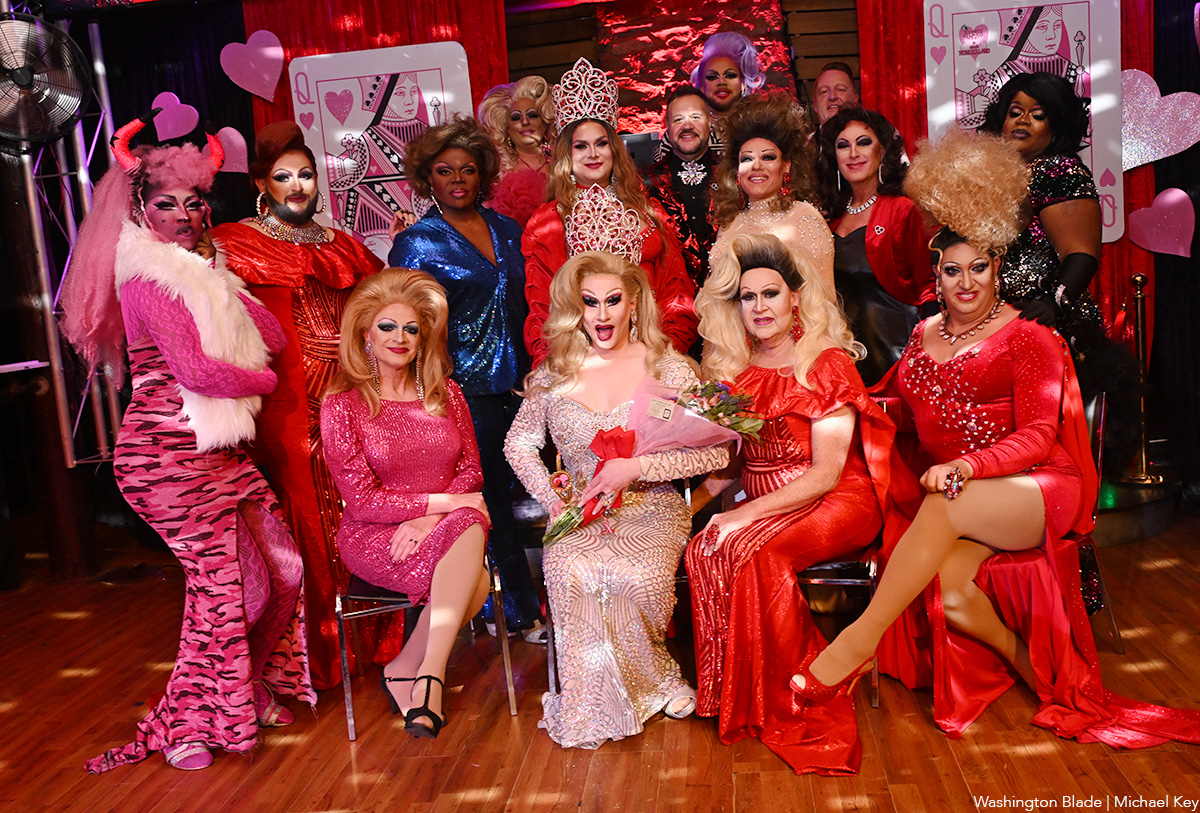
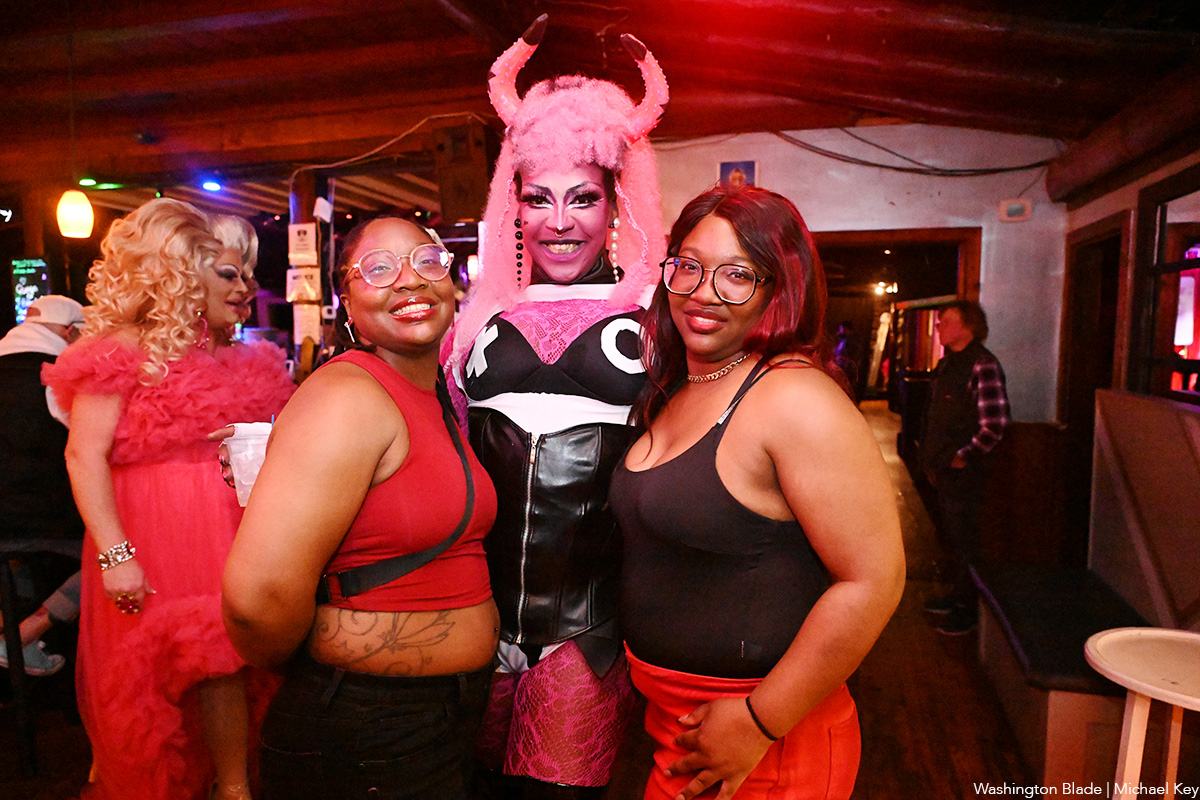
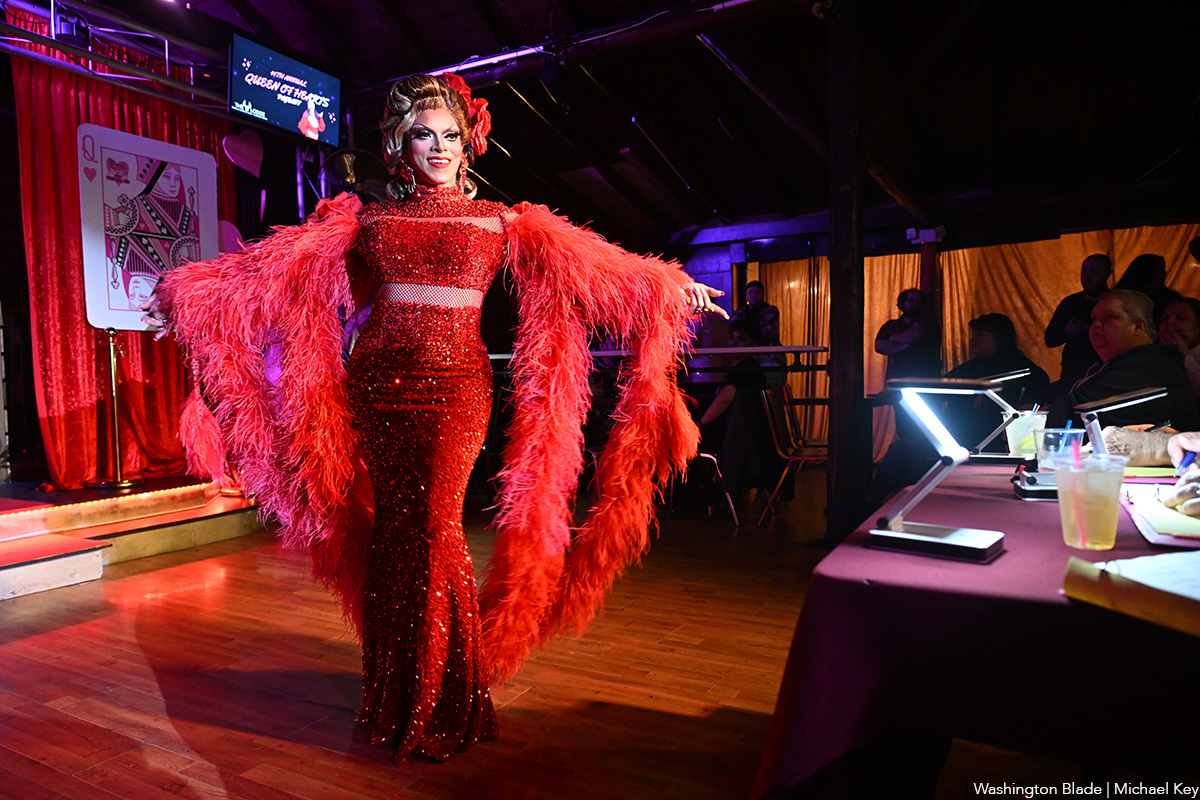
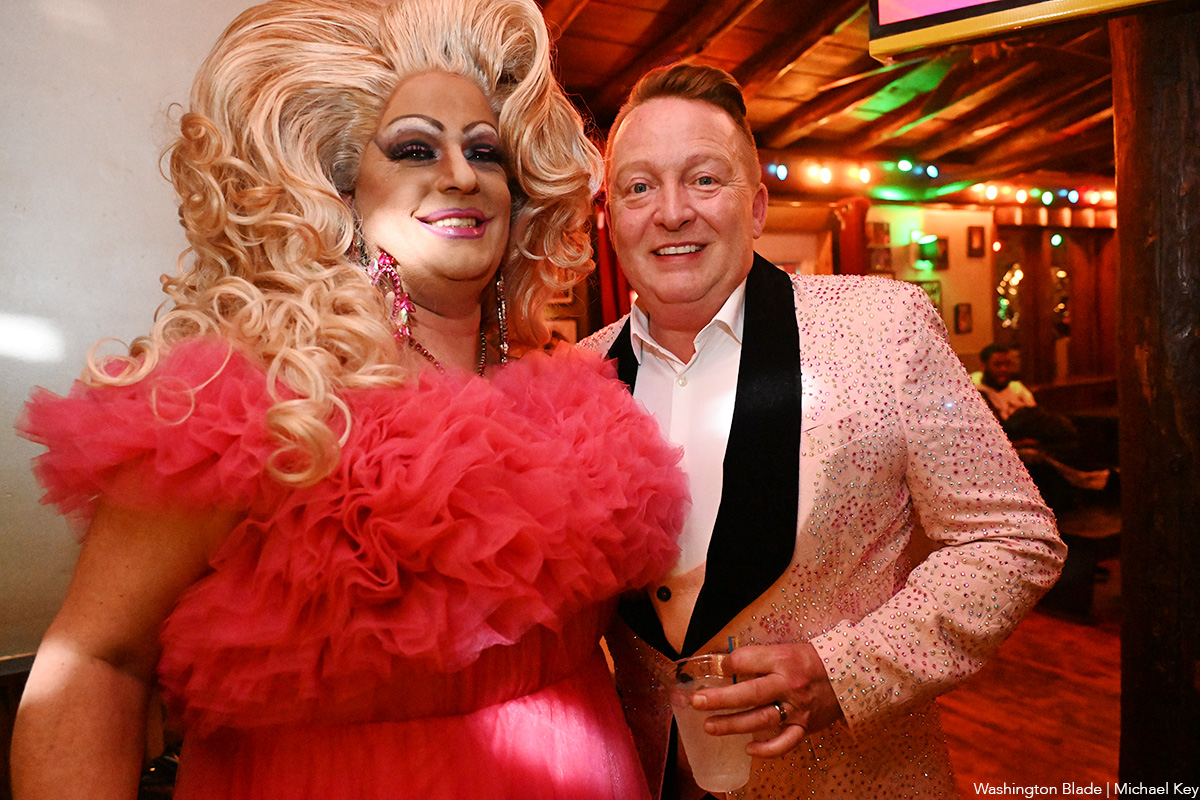
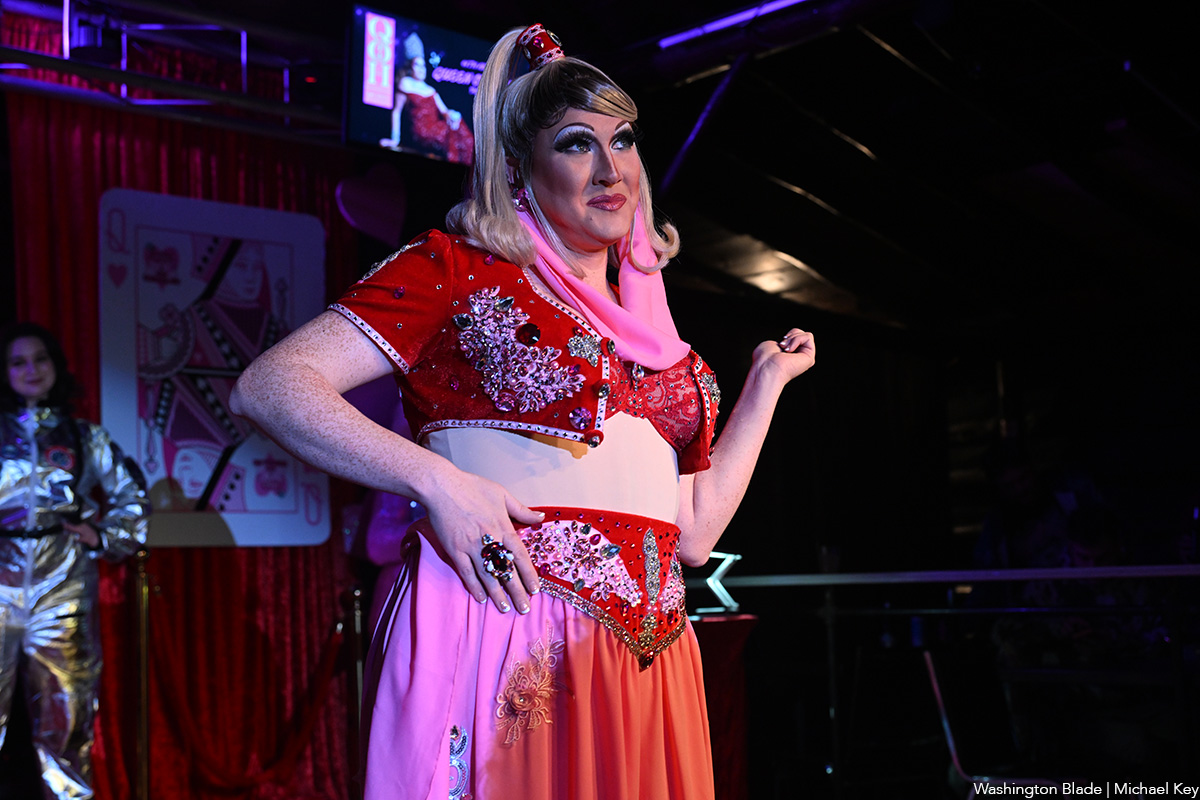
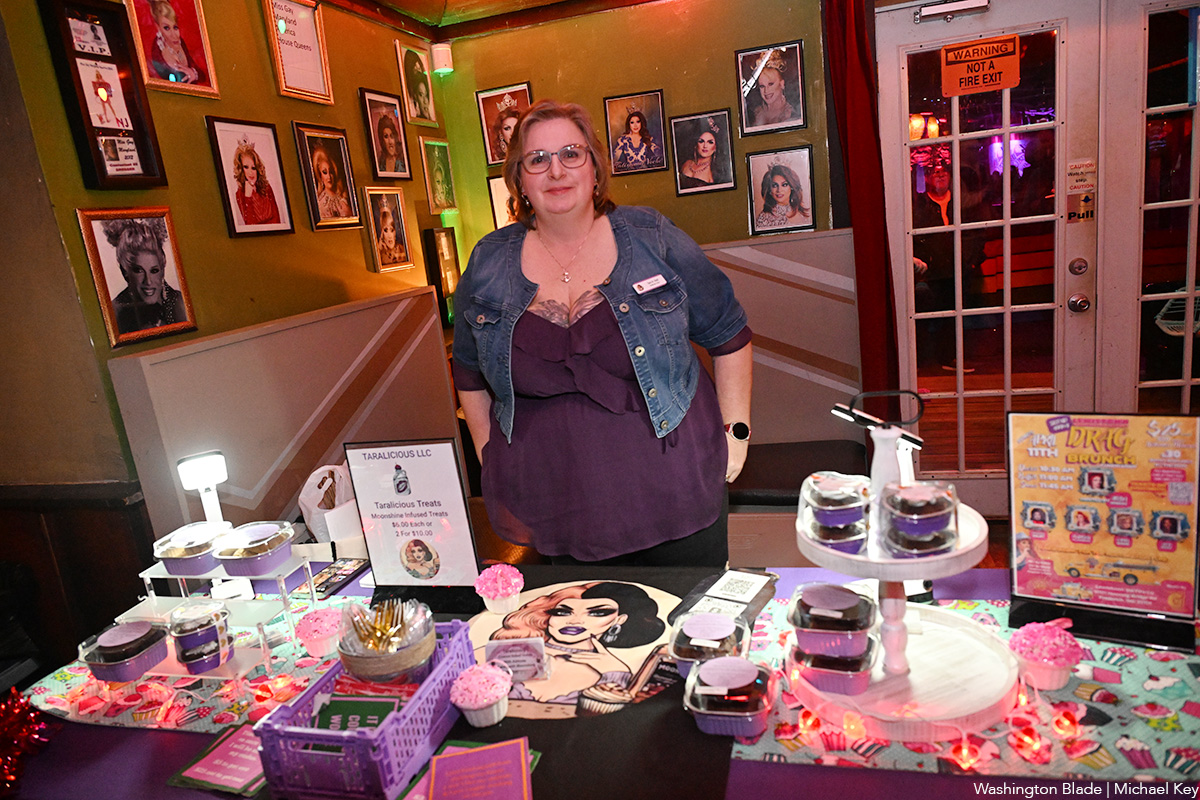
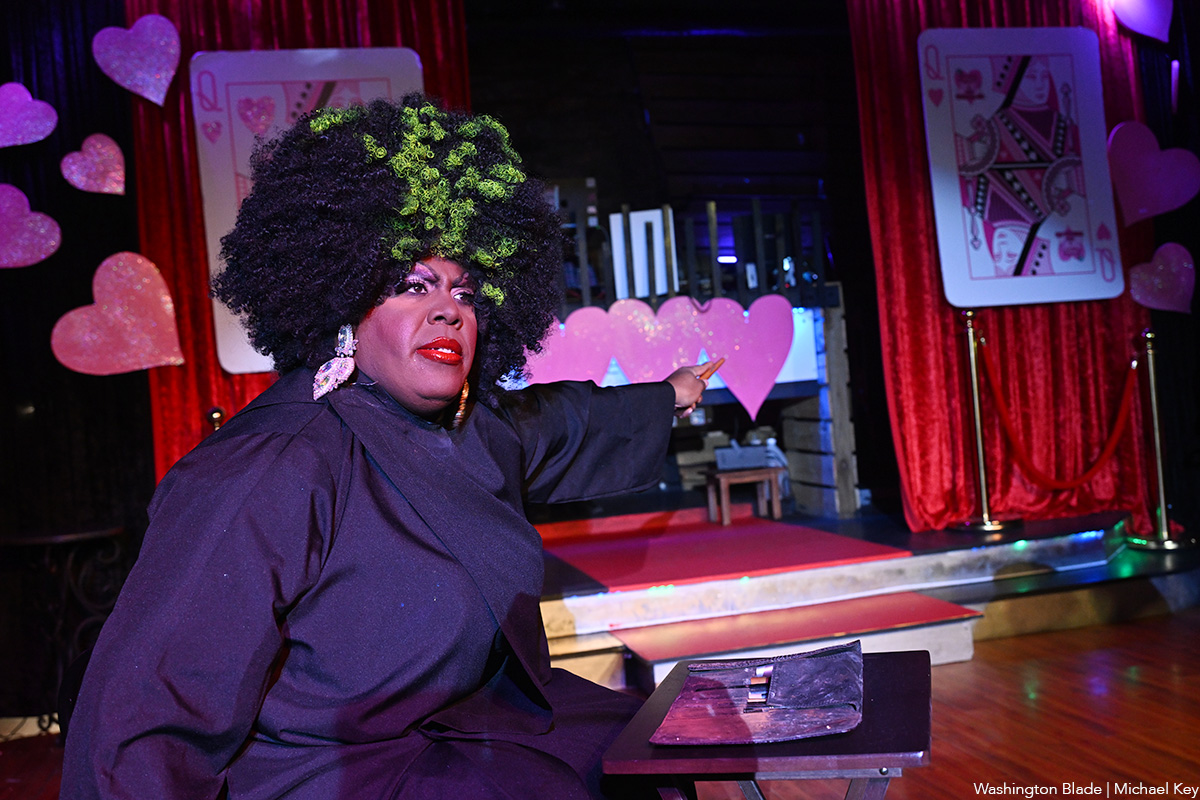
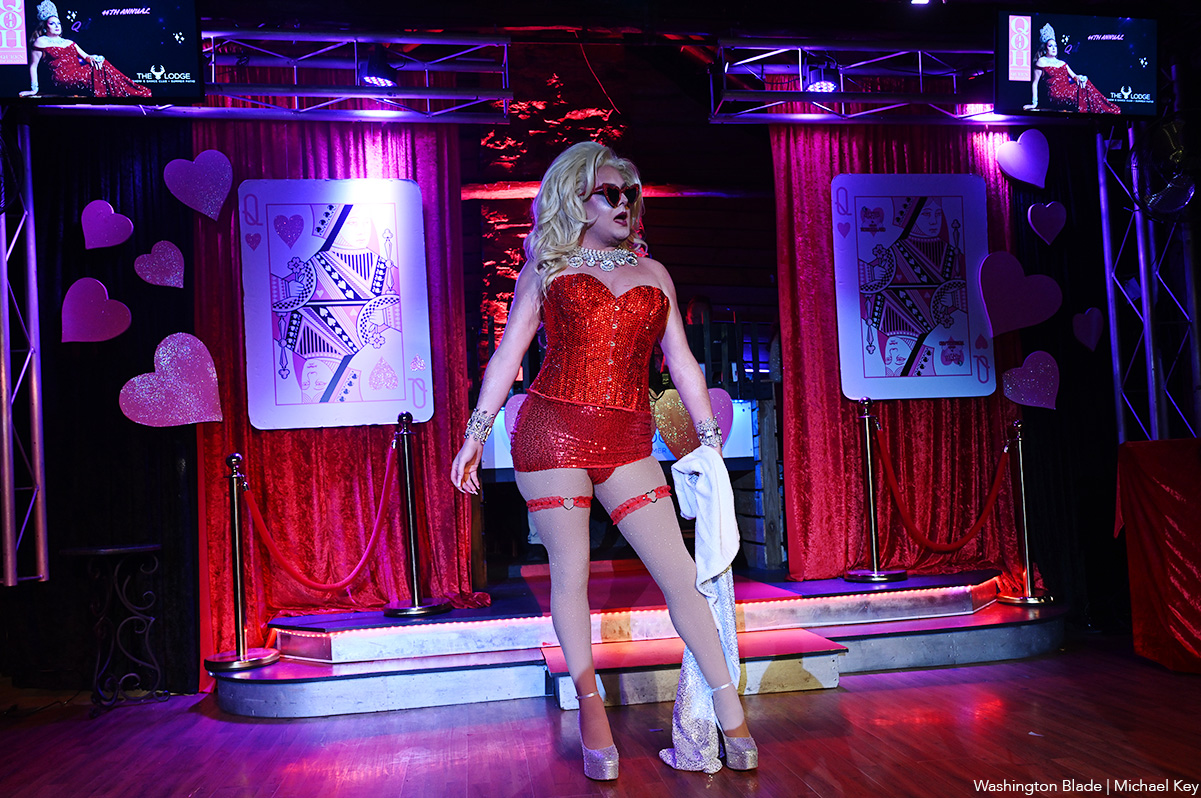
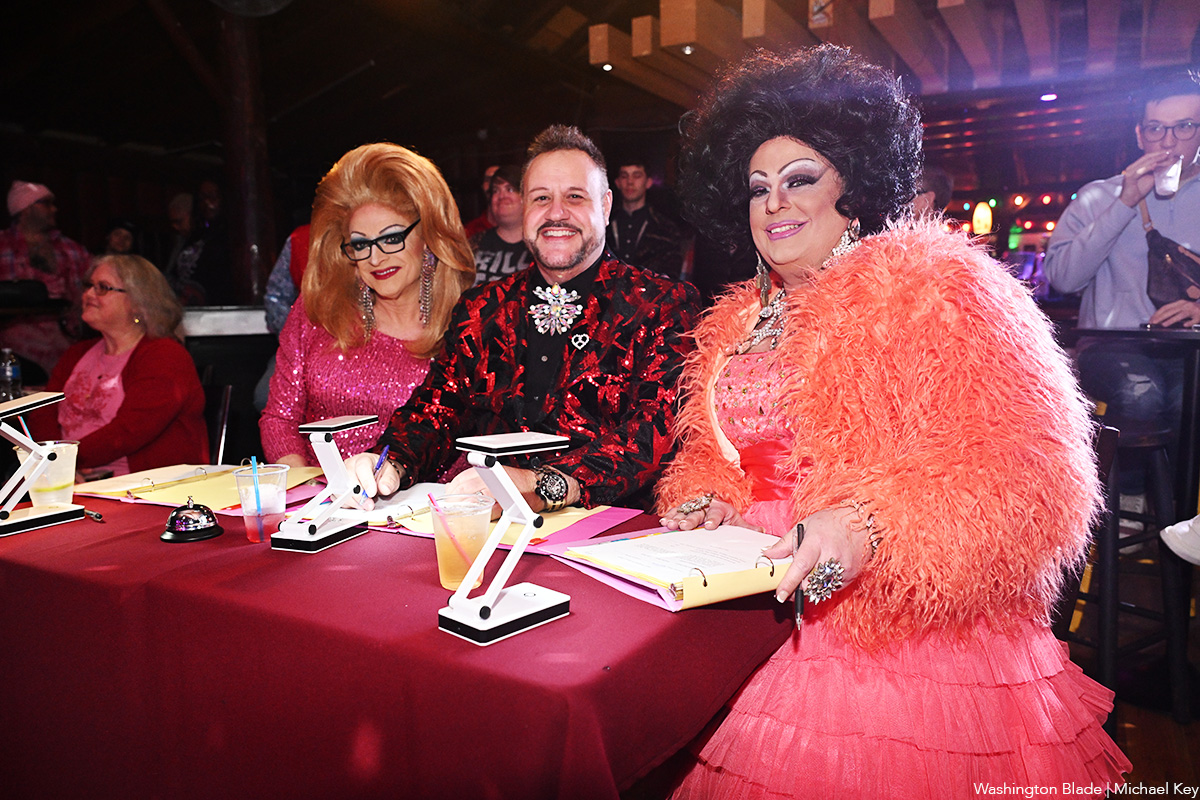
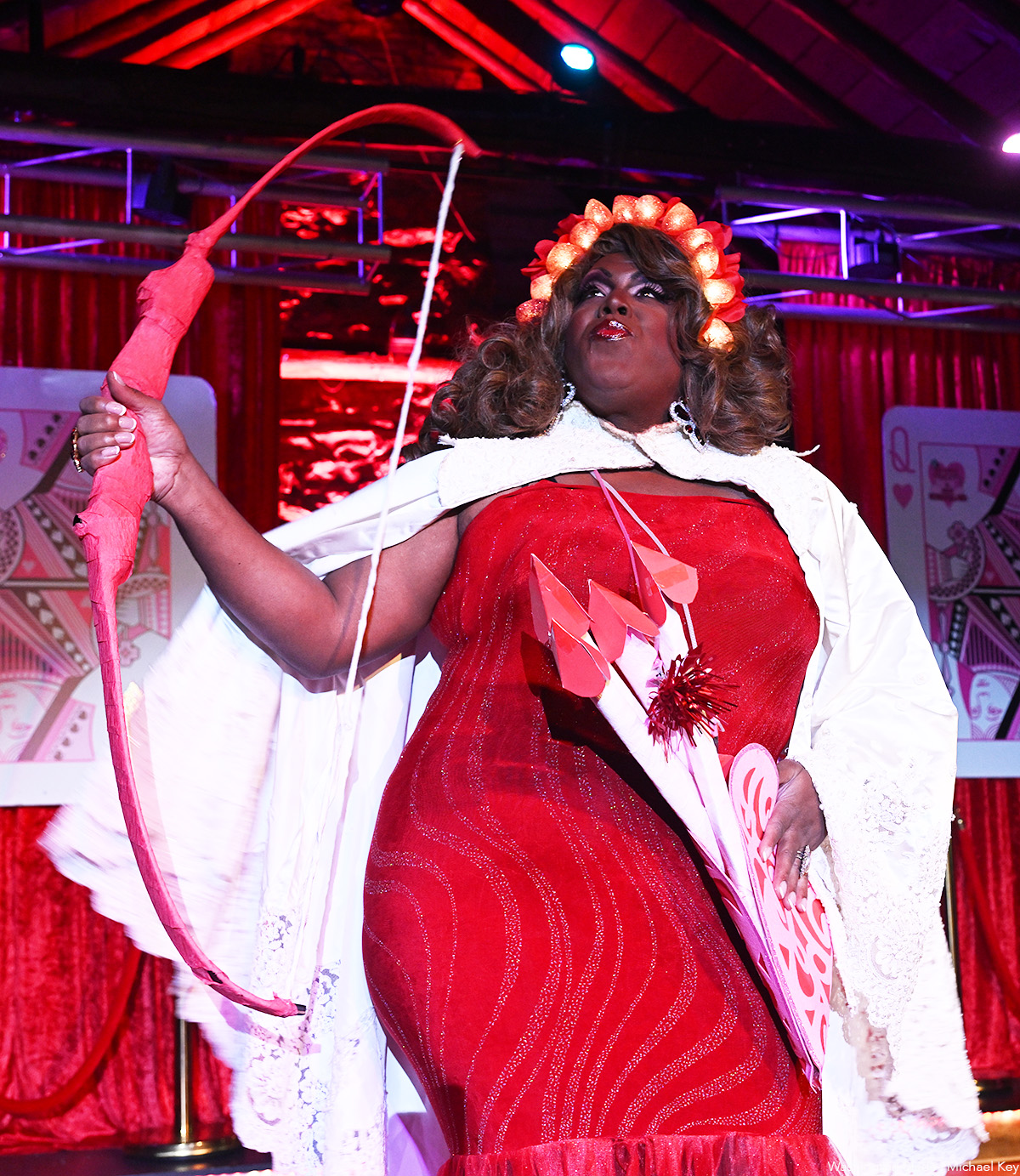
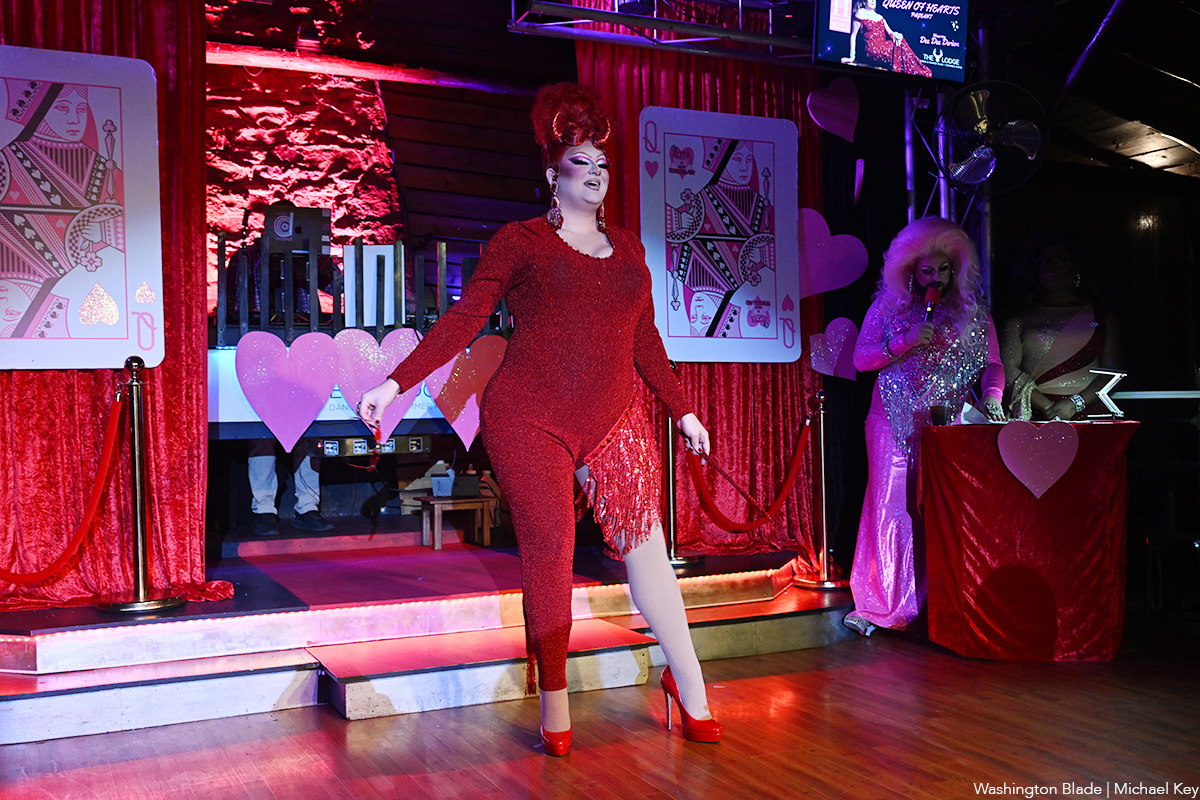
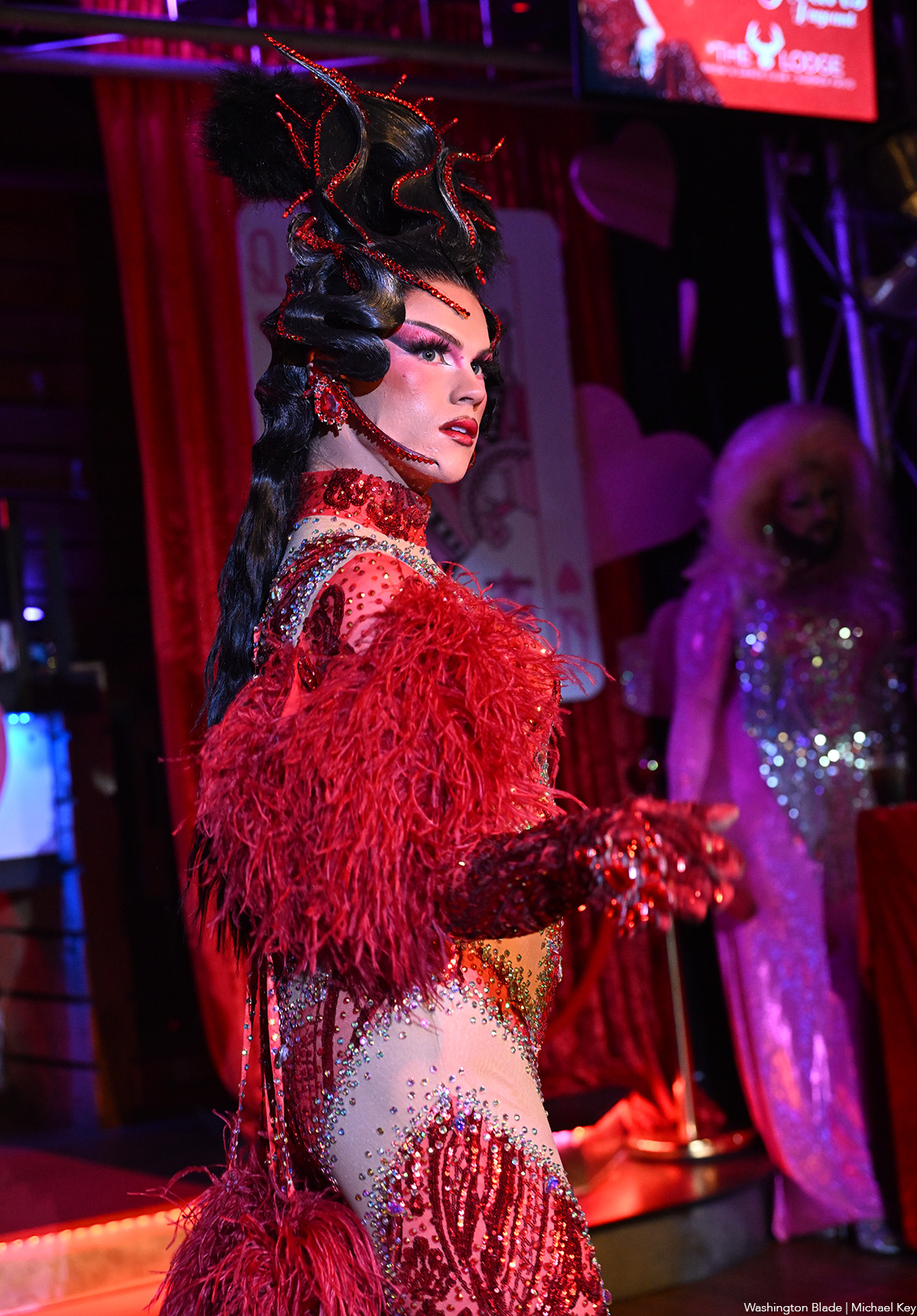
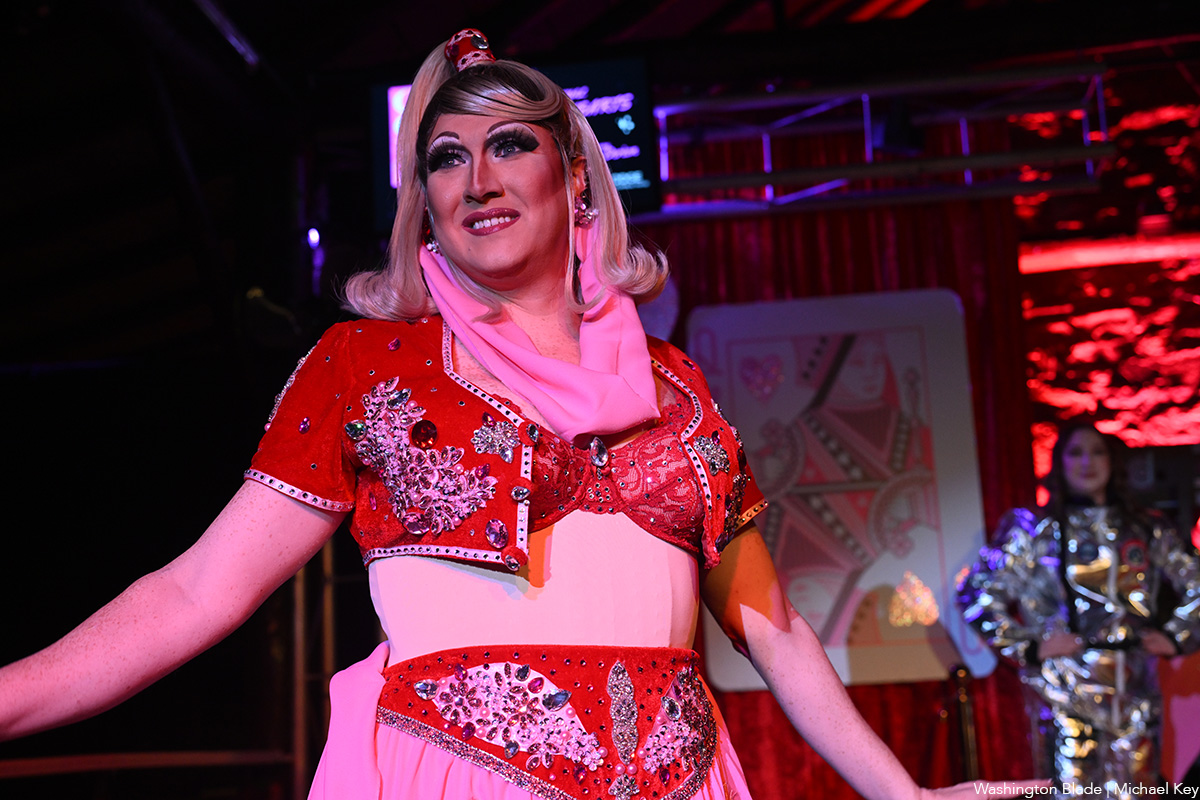
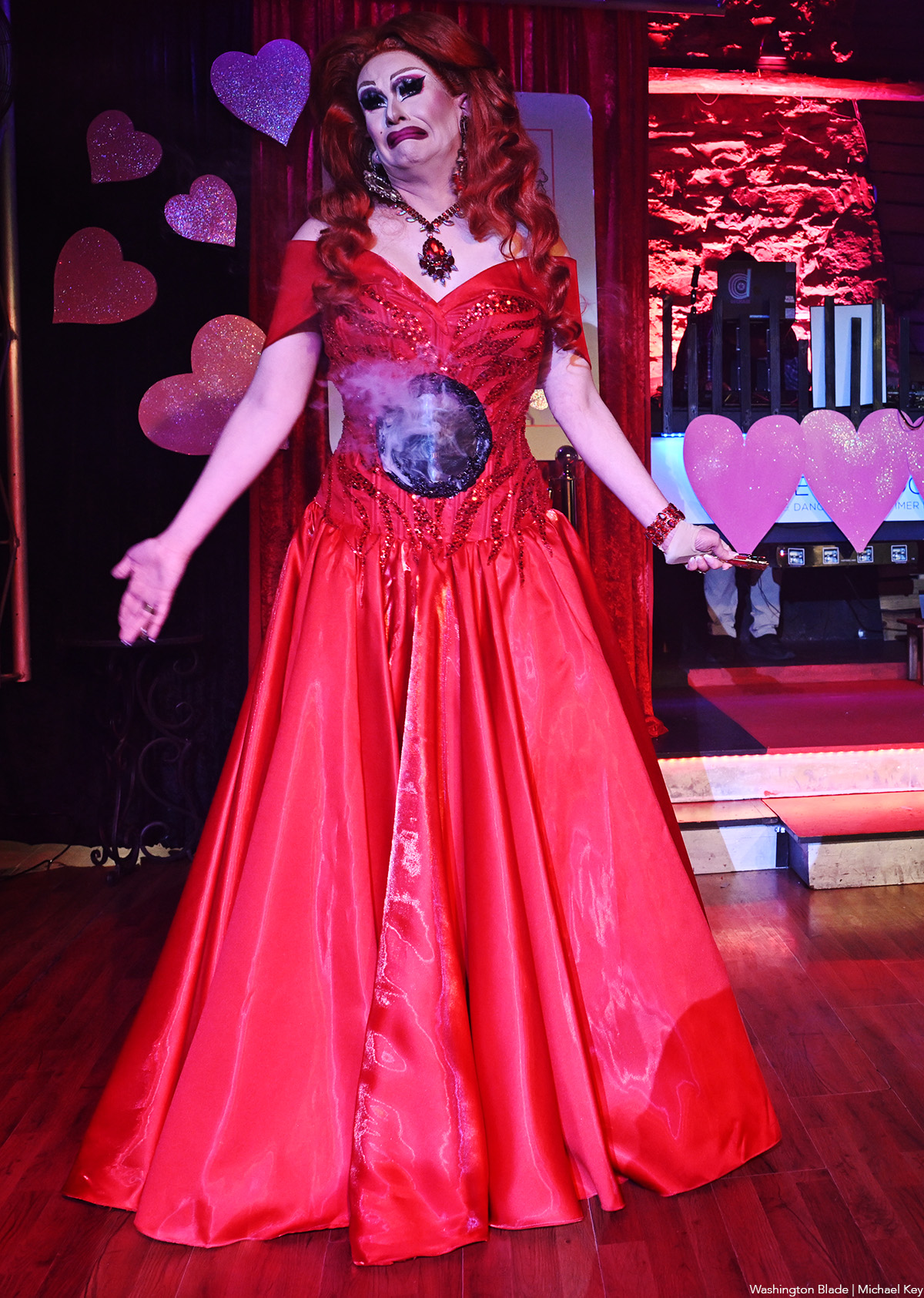
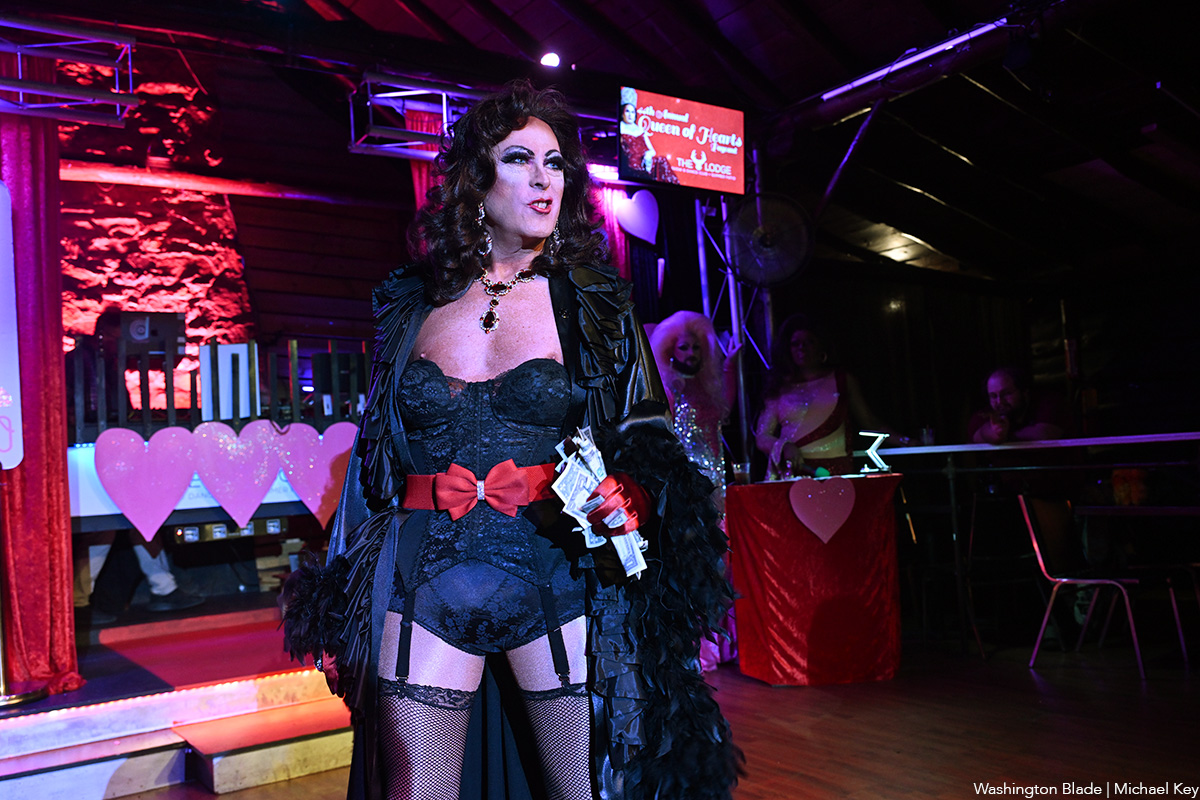
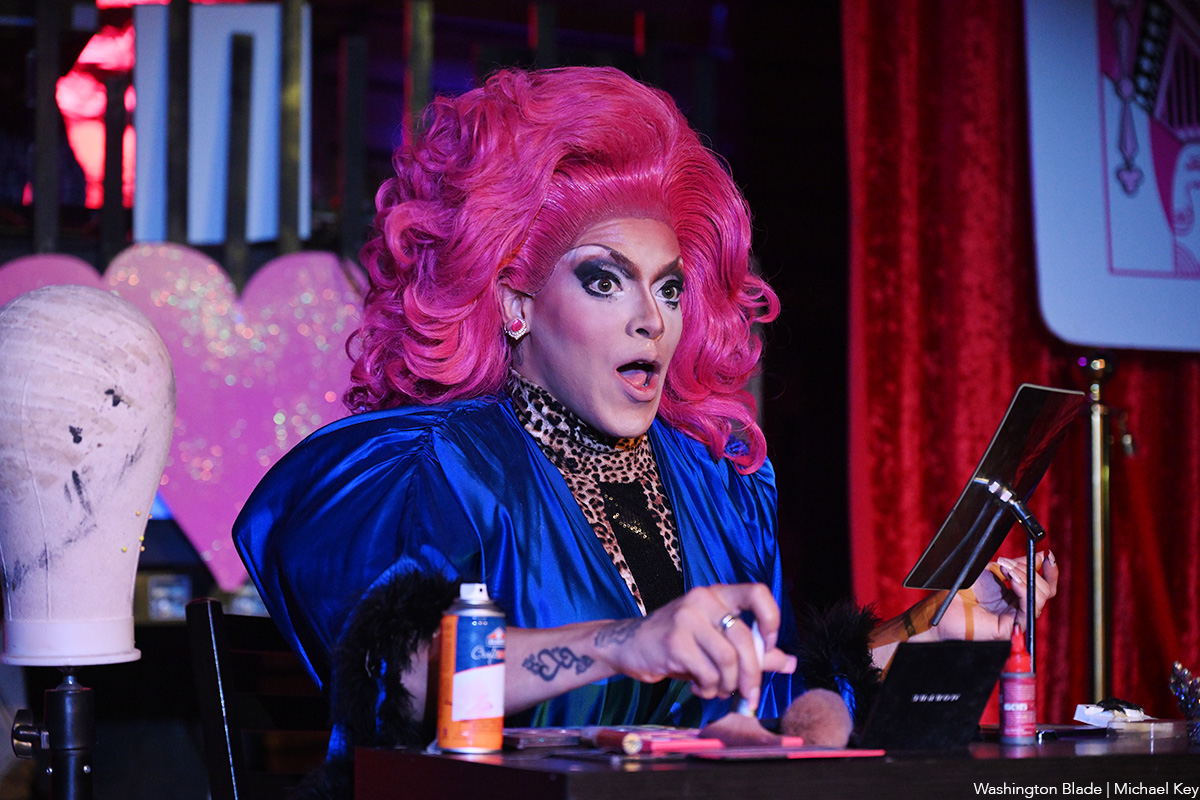
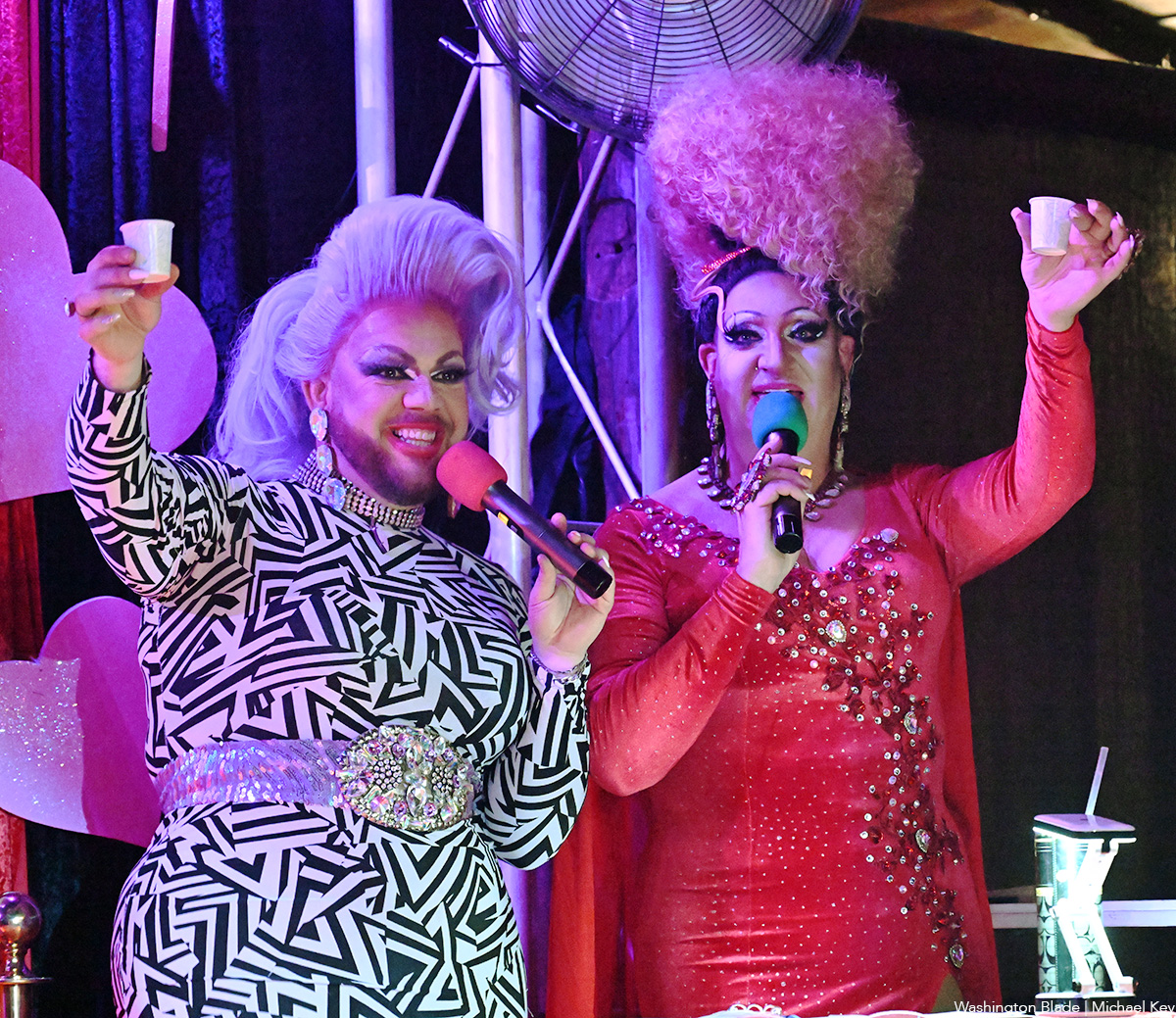
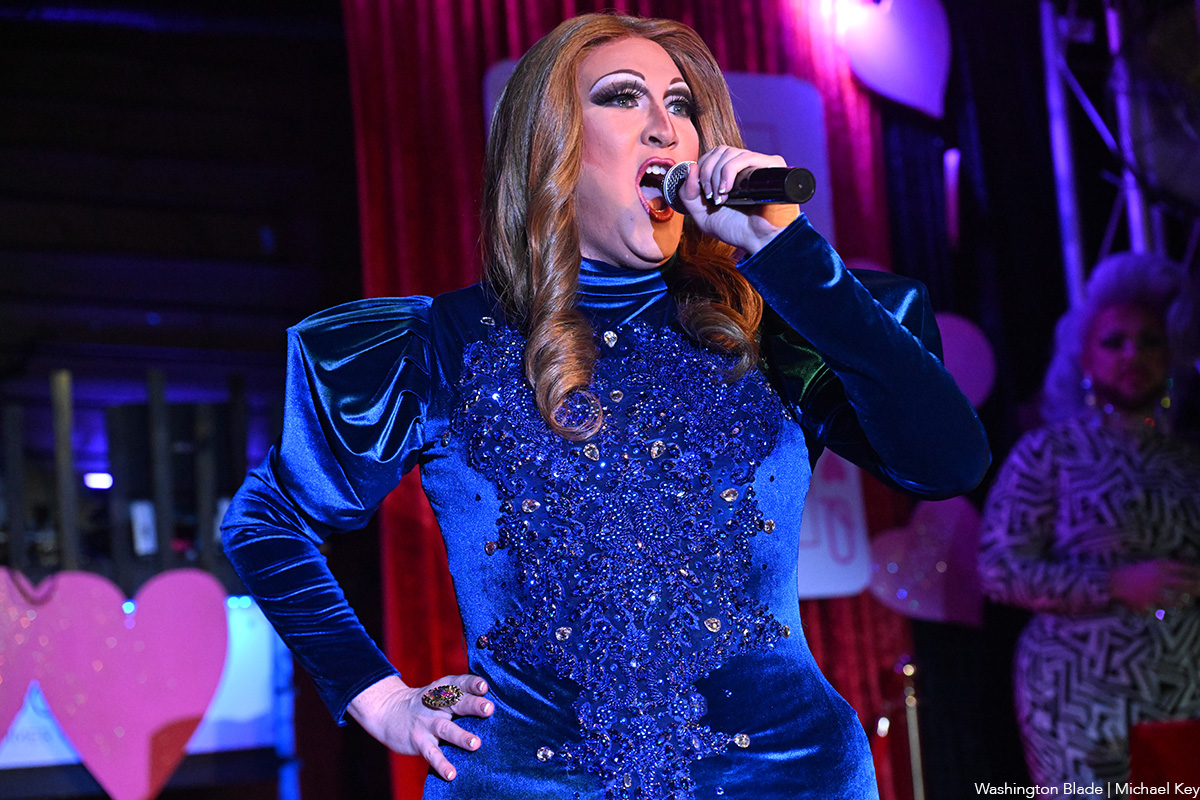
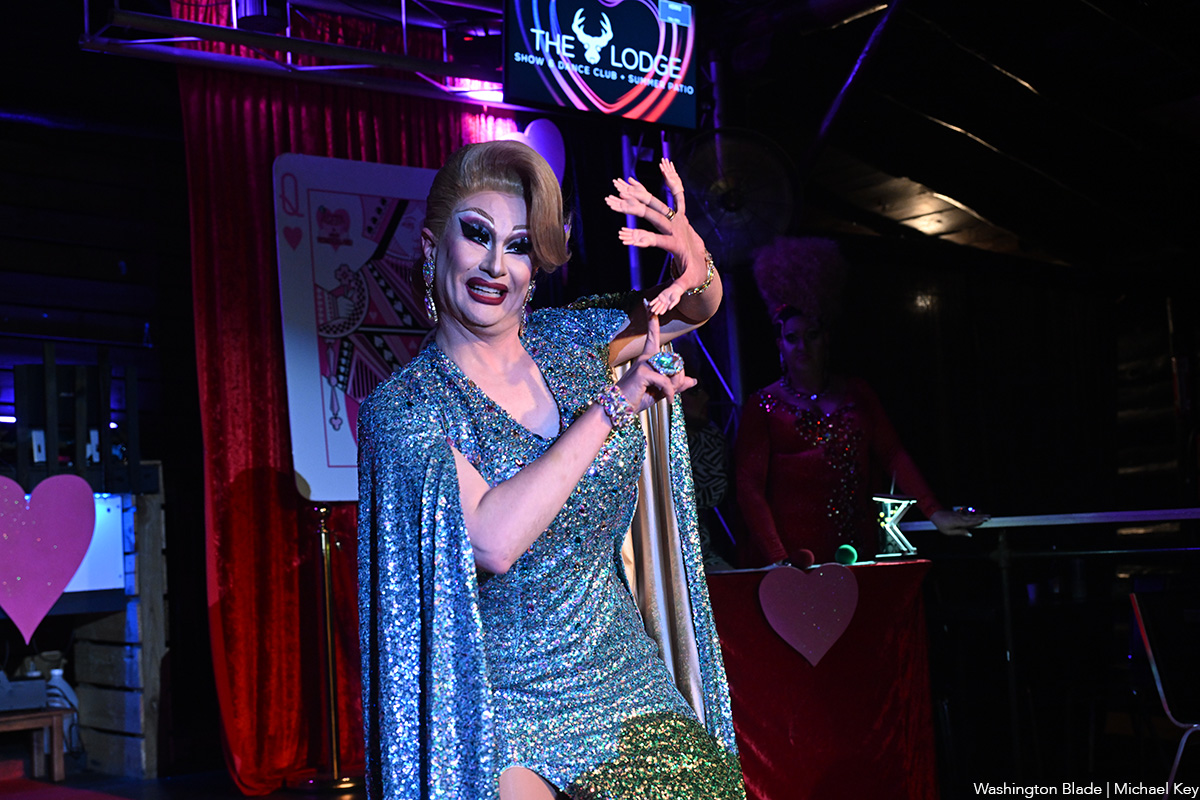
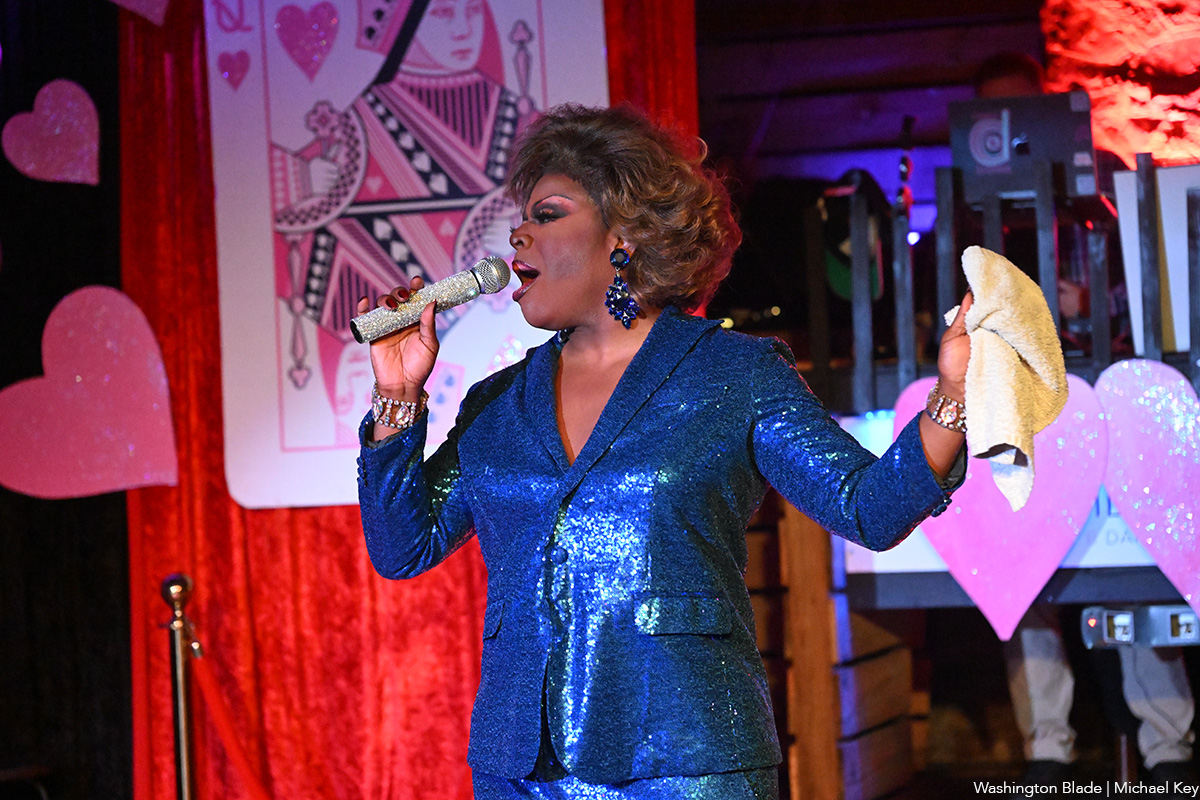
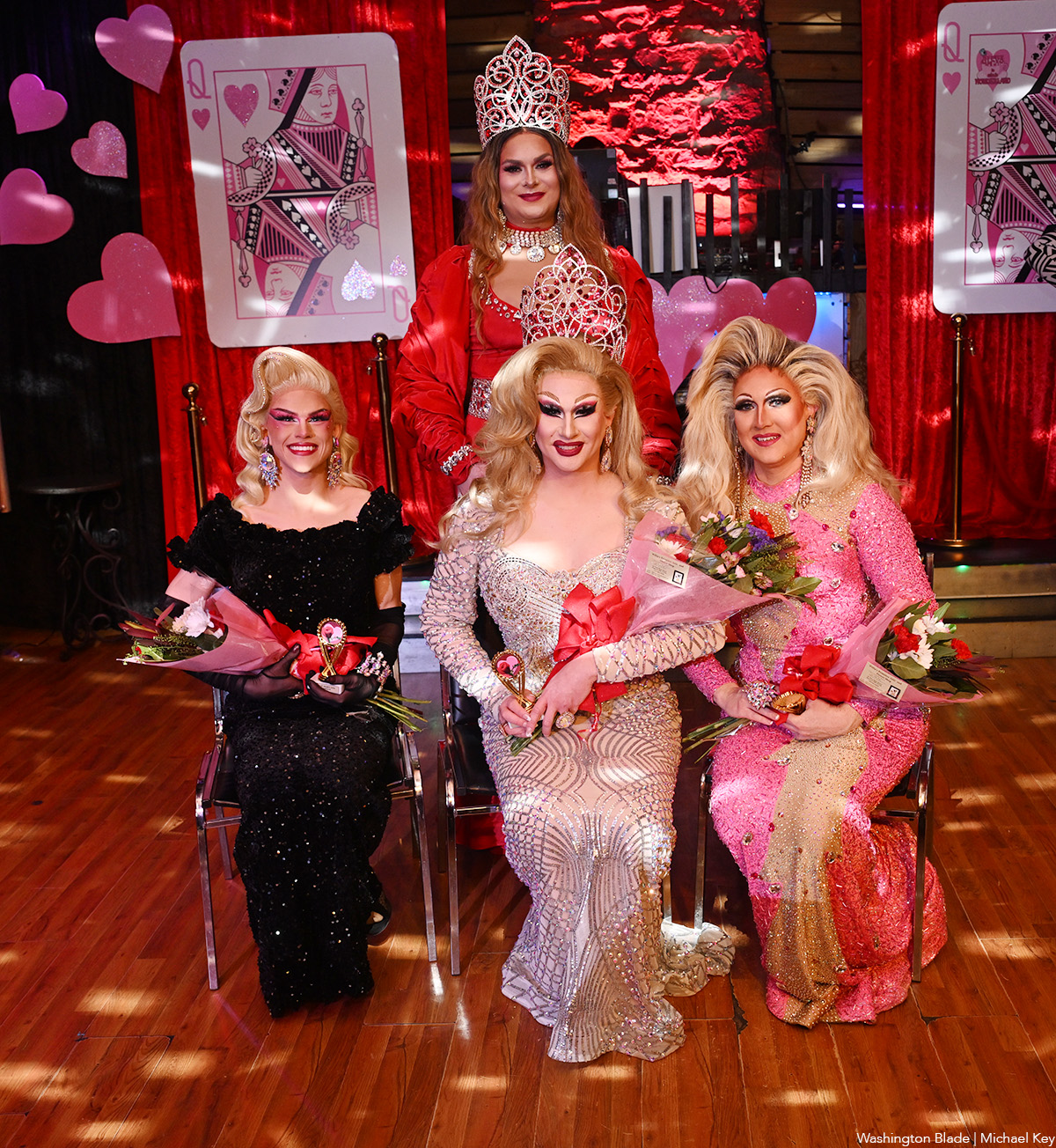
View on Threads
Books
New book profiles LGBTQ Ukrainians, documents war experiences
Tuesday marks four years since Russia attacked Ukraine

Journalist J. Lester Feder’s new book profiles LGBTQ Ukrainians and their experiences during Russia’s war against their country.
Feder for “The Queer Face of War: Portraits and Stories from Ukraine” interviewed and photographed LGBTQ Ukrainians in Kyiv, the country’s capital, and in other cities. They include Olena Hloba, the co-founder of Tergo, a support group for parents and friends of LGBTQ Ukrainians, who fled her home in the Kyiv suburb of Bucha shortly after Russia launched its war on Feb. 24, 2022.
Russian soldiers killed civilians as they withdrew from Bucha. Videos and photographs that emerged from the Kyiv suburb showed dead bodies with their hands tied behind their back and other signs of torture.

Olena Shevchenko, chair of Insight, a Ukrainian LGBTQ rights group, wrote the book’s forward.

The book also profiles Viktor Pylypenko, a gay man who the Ukrainian military assigned to the 72nd Mechanized Black Cossack Brigade after the war began. Feder writes Pylypenko’s unit “was deployed to some of the fiercest and most important battles of the war.”
“The brigade was pivotal to beating Russian forces back from Kyiv in their initial attempt to take the capital, helping them liberate territory near Kharkiv and defending the front lines in Donbas,” wrote Feder.
Pylypenko spent two years fighting “on Ukraine’s most dangerous battlefields, serving primarily as a medic.”
“At times he felt he was living in a horror movie, watching tank shells tear his fellow soldiers apart before his eyes,” wrote Feder. “He held many men as they took their final breaths. Of the roughly one hundred who entered the unit with him, only six remained when he was discharged in 2024. He didn’t leave by choice: he went home to take care of his father, who had suffered a stroke.”
Feder notes one of Pylypenko’s former commanders attacked him online when he came out. Pylypenko said another commander defended him.
Feder also profiled Diana and Oleksii Polukhin, two residents of Kherson, a port city in southern Ukraine that is near the mouth of the Dnieper River.
Ukrainian forces regained control of Kherson in November 2022, nine months after Russia occupied it.
Diana, a cigarette vender, and Polukhin told Feder that Russian forces demanded they disclose the names of other LGBTQ Ukrainians in Kherson. Russian forces also tortured Diana and Polukhin while in their custody.
Polukhim is the first LGBTQ victim of Russian persecution to report their case to Ukrainian prosecutors.

Feder, who is of Ukrainian descent, first visited Ukraine in 2013 when he wrote for BuzzFeed.
He was Outright International’s Senior Fellow for Emergency Research from 2021-2023. Feder last traveled to Ukraine in December 2024.
Feder spoke about his book at Politics and Prose at the Wharf in Southwest D.C. on Feb. 6. The Washington Blade spoke with Feder on Feb. 20.
Feder told the Blade he began to work on the book when he was at Outright International and working with humanitarian groups on how to better serve LGBTQ Ukrainians. Feder said military service requirements, a lack of access to hormone therapy and documents that accurately reflect a person’s gender identity and LGBTQ-friendly shelters are among the myriad challenges that LGBTQ Ukrainians have faced since the war began.
“All of these were components of a queer experience of war that was not well documented, and we had never seen in one place, especially with photos,” he told the Blade. “I felt really called to do that, not only because of what was happening in Ukraine, but also as a way to bring to the surface issues that we’d had seen in Iraq and Syria and Afghanistan.”

Feder also spoke with the Blade about the war’s geopolitical implications.
Russian President Vladimir Putin in 2013 signed a law that bans the “promotion of homosexuality” to minors.
The 2014 Winter Olympics took place in Sochi, a Russian resort city on the Black Sea. Russia annexed Crimea from Ukraine a few weeks after the games ended.
Russia’s anti-LGBTQ crackdown has continued over the last decade.
The Russian Supreme Court in 2023 ruled the “international LGBT movement” is an extremist organization and banned it. The Russian Justice Ministry last month designated ILGA World, a global LGBTQ and intersex rights group, as an “undesirable” organization.
Ukraine, meanwhile, has sought to align itself with Europe.
Ukrainian President Volodymyr Zelenskyy after a 2021 meeting with then-President Joe Biden at the White House said his country would continue to fight discrimination based on sexual orientation and gender identity. (Zelenskyy’s relationship with the U.S. has grown more tense since the Trump-Vance administration took office.) Zelenskyy in 2022 publicly backed civil partnerships for same-sex couples.
Then-Ukrainian Ambassador to the U.S. Oksana Markarova in 2023 applauded Kyiv Pride and other LGBTQ and intersex rights groups in her country when she spoke at a photo exhibit at Ukraine House in D.C. that highlighted LGBTQ and intersex soldiers. Then-Kyiv Pride Executive Director Lenny Emson, who Feder profiles in his book, was among those who attended the event.
“Thank you for everything you do in Kyiv, and thank you for everything that you do in order to fight the discrimination that still is somewhere in Ukraine,” said Markarova. “Not everything is perfect yet, but you know, I think we are moving in the right direction. And we together will not only fight the external enemy, but also will see equality.”
Feder in response to the Blade’s question about why he decided to write his book said he “didn’t feel” the “significance of Russia’s war against Ukraine” for LGBTQ people around the world “was fully understood.”
“This was an opportunity to tell that big story,” he said.
“The crackdown on LGBT rights inside Russia was essentially a laboratory for a strategy of attacking democratic values by attacking queer rights and it was one as Ukraine was getting closet to Europe back in 2013, 2014,” he added. “It was a strategy they were using as part of their foreign policy, and it was one they were using not only in Ukraine over the past decade, but around the world.”
Feder said Republicans are using “that same strategy to attack queer people, to attack democracy itself.”
“I felt like it was important that Americans understand that history,” he said.

More than a dozen LGBTQ athletes won medals at the Milan Cortina Winter Olympics that ended on Sunday.
Cayla Barnes, Hilary Knight, and Alex Carpenter are LGBTQ members of the U.S. women’s hockey team that won a gold medal after they defeated Canada in overtime. Knight the day before the Feb. 19 match proposed to her girlfriend, Brittany Bowe, an Olympic speed skater.
French ice dancer Guillaume Cizeron, who is gay, and his partner Laurence Fournier Beaudry won gold. American alpine skier Breezy Johnson, who is bisexual, won gold in the women’s downhill. Amber Glenn, who identifies as bisexual and pansexual, was part of the American figure skating team that won gold in the team event.
Swiss freestyle skier Mathilde Gremaud, who is in a relationship with Vali Höll, an Austrian mountain biker, won gold in women’s freeski slopestyle.
Bruce Mouat, who is the captain of the British curling team that won a silver medal, is gay. Six members of the Canadian women’s hockey team — Emily Clark, Erin Ambrose, Emerance Maschmeyer, Brianne Jenner, Laura Stacey, and Marie-Philip Poulin — that won silver are LGBTQ.
Swedish freestyle skier Sandra Naeslund, who is a lesbian, won a bronze medal in ski cross.
Belgian speed skater Tineke den Dulk, who is bisexual, was part of her country’s mixed 2000-meter relay that won bronze. Canadian ice dancer Paul Poirier, who is gay, and his partner, Piper Gilles, won bronze.
Laura Zimmermann, who is queer, is a member of the Swiss women’s hockey team that won bronze when they defeated Sweden.
Outsports.com notes all of the LGBTQ Olympians who competed at the games and who medaled.
-

 District of Columbia4 days ago
District of Columbia4 days agoJudge rescinds order against activist in Capital Pride lawsuit
-

 District of Columbia4 days ago
District of Columbia4 days agoTrans activists arrested outside HHS headquarters in D.C.
-

 Opinions4 days ago
Opinions4 days agoHow do we honor Renee Good, Alex Pretti?
-

 Sports5 days ago
Sports5 days agoUS wins Olympic gold medal in women’s hockey




















